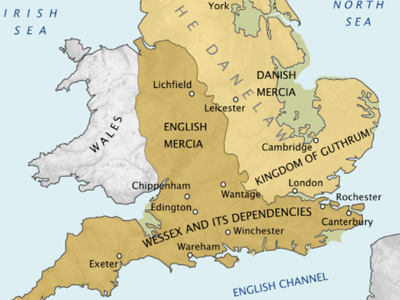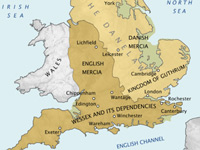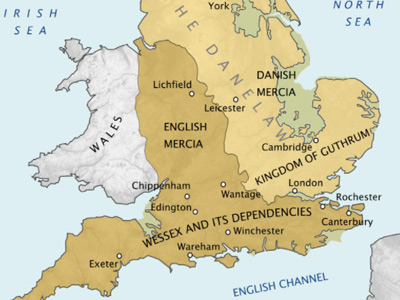Battle of Edington (878 AD)

Battle
This was even more true after the Twelfth Night attack. With his small warband, a fraction of his army at Chippenham, Alfred could not hope to retake the town from the Danes, who had in previous battles (for example at Reading in 871) proved themselves adept at defending fortified positions. So he retreated to the south, preparing himself and his forces for another battle, and then defeated Guthrum and his host. The first we read of Alfred after the disaster at Chippenham is around Easter, when he built a fortress at Athelney. In the seventh week after Easter, or between 4 and 7 May, Alfred called a levy at Ecgbryhtesstan (Egbert's Stone). Many of the men in the counties around (Somerset, Wiltshire, and Hampshire) who had not already fled rallied to him there. The next day, Alfred's host moved to Iley Oak, and then the day after that to Ethandun. There, on an unknown date between 6 and 12 May, they fought the Danes. According to the Life:
"Fighting ferociously, forming a dense shield-wall against the whole army of the Pagans, and striving long and bravely...at last he [Alfred] gained the victory. He overthrew the Pagans with great slaughter, and smiting the fugitives, he pursued them as far as the fortress ."
After the victory, when the Danes had taken refuge in the fortress, the West Saxons removed all food that the Danes might be able to capture in a sortie, and waited. After two weeks, the hungry Danes sued for peace, giving Alfred "preliminary hostages and solemn oaths that they would leave his kingdom immediately", just as usual, but in addition promising that Guthrum would be baptized. The primary difference between this agreement and the treaties at Wareham and Exeter was that Alfred had decisively defeated the Danes at Edington, rather than just stopping them, and therefore it seemed more likely that they would keep to the terms of the treaty.
The primary reason for Alfred's victory was probably the relative size of the two armies. The men of even one shire could be a formidable fighting force, as those of Devon proved in the same year, defeating an army under Ubbe Ragnarsson at the Battle of Cynwit. In addition, in 875 Guthrum had lost the support of other Danish lords, including Ivar and Ubbe. Further Danish forces had settled on the land before Guthrum attacked Wessex: in East Anglia, and in Mercia between the treaty at Exeter and the attack on Chippenham; many others were lost in a storm off Swanage in 876-7, with 120 ships wrecked Internal disunity was threatening to tear the Danes apart, and they needed time to reorganize. Fortunately for Wessex they did not use the time available effectively.
HISTORY

RESOURCES
This article uses material from the Wikipedia article "Battle of Edington (878 AD)", which is released under the Creative Commons Attribution-Share-Alike License 3.0.
© Stories Preschool. All Rights Reserved.









